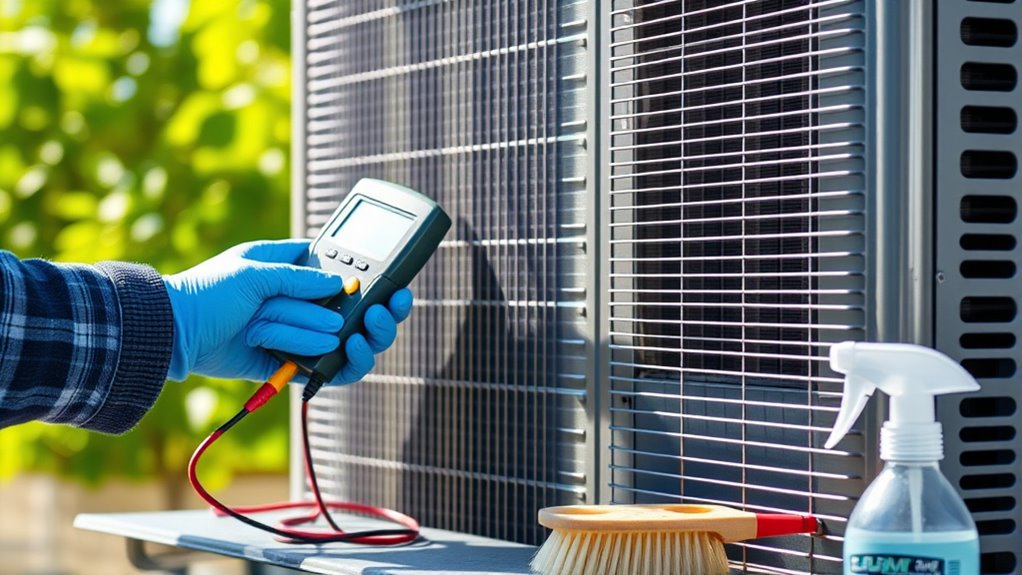To prepare your cooling system for summer, schedule a professional refrigerant recharge and check for leaks, ensuring your unit cools efficiently. Clean or replace filters regularly and inspect outdoor components for debris or obstructions to maximize airflow. Performing duct cleaning and tightening electrical connections can prevent breakdowns. Regular maintenance helps your system run smoothly and extends its lifespan. Keep learning these simple steps to stay cool and comfortable all season long.
Key Takeaways
- Schedule professional refrigerant recharge and leak detection before summer to ensure optimal cooling performance.
- Regularly clean and inspect ductwork to improve airflow and indoor air quality.
- Replace or clean filters frequently and check outdoor units for debris or obstructions.
- Tighten electrical connections and keep the outdoor unit clear of debris for efficient operation.
- Arrange annual professional system inspections to identify and address potential issues early.

As summer approaches, guaranteeing your cooling system is in top shape becomes essential to stay comfortable and avoid costly breakdowns. One of the first steps you should take is scheduling a professional refrigerant recharge if your system is not cooling as efficiently as it used to. Low refrigerant levels can lead to reduced cooling capacity, increased energy consumption, and potential damage to the compressor. A trained technician can check the refrigerant levels, identify leaks, and recharge the system with the correct amount to keep it running smoothly throughout the hot months. Don’t ignore subtle signs like warm air blowing from vents or longer cooling cycles, as these often point to refrigerant issues that need immediate attention.
In addition to refrigerant maintenance, pay attention to your ductwork. Over time, ducts can accumulate dust, dirt, and debris, which restrict airflow and diminish your system’s efficiency. Scheduling duct cleaning before summer hits ensures that cool air flows freely into your living spaces, improving comfort and reducing energy costs. Clean ducts also improve indoor air quality by removing allergens and pollutants that can get trapped in the system. If you notice uneven cooling or unexplained allergies worsening, duct cleaning might be the solution. It’s a simple yet effective way to optimize your system’s performance without replacing expensive equipment.
While focusing on refrigerant recharge and duct cleaning, don’t forget other routine maintenance tasks. Replacing or cleaning filters regularly keeps dust and debris from circulating through your system, which can strain components and decrease efficiency. Check your outdoor unit for debris, leaves, or obstructions that could hinder airflow. Keep the area around the condenser clear to allow proper heat exchange. Additionally, inspecting and tightening electrical connections can prevent unexpected shutdowns during the hottest days. A well-maintained unit is less likely to break down in the middle of a heatwave, saving you both discomfort and money. Regular air purifier maintenance and cleaning can also help improve indoor air quality during the summer months.
Finally, scheduling an annual professional inspection before summer arrives helps catch potential issues early. A technician can evaluate your system’s overall health, perform refrigerant recharge if needed, and recommend duct cleaning if it’s been a while. Taking these proactive steps not only ensures your cooling system operates efficiently but also extends its lifespan. Staying ahead of problems means fewer surprises during the heat of summer, and you’ll enjoy a cooler, more comfortable home with less worry about breakdowns or high energy bills. Regular maintenance now pays off in comfort and savings as the temperatures climb.

ZeroR AC Recharge Kit R134a Replacement – Eco-Friendly Refrigerant Gas with 24-Inch Charging Hose Tool for SSV Cans, 2-Pack
IMPORTANT! – (1) Verify that you have an R134a system before purchasing! Do not rely on amazon data…
As an affiliate, we earn on qualifying purchases.
As an affiliate, we earn on qualifying purchases.
Frequently Asked Questions
How Often Should I Replace My Cooling System’s Air Filters?
You should replace your cooling system’s air filters every 1 to 3 months, depending on the air filter lifespan and filter replacement frequency recommended by the manufacturer. If you have pets, allergies, or live in a dusty area, consider replacing filters more often. Regularly checking your filters guarantees peak airflow and energy efficiency. Don’t wait too long, as dirty filters can strain your system and reduce its effectiveness.
Can I Perform Cooling System Maintenance Myself?
Imagine your family depends on a cool home during scorching days—can you handle DIY maintenance? Yes, you can, but prioritize safety precautions. Start by turning off the power and wearing protective gear. Clean or replace filters, check for leaks, and clear debris around the unit. If you’re unsure or uncomfortable, it’s smart to call a professional. Your safety and system’s efficiency depend on cautious, informed DIY maintenance.
What Are the Signs My Cooling System Needs Repair?
If your cooling system needs repair, watch for signs like refrigerant leaks, which cause reduced cooling efficiency, and unusual noises, such as banging or hissing sounds. You might also notice increased energy bills, frequent cycling, or a system that won’t turn on. Address these issues promptly to prevent further damage. Regular inspections can help catch problems early, ensuring your system runs smoothly all summer.
How Does Outdoor Weather Affect Cooling System Performance?
When outdoor temperature rises, your cooling system works harder, reducing efficiency and increasing energy bills. For example, during a heatwave, high outdoor temperatures and humidity levels cause the system to strain, struggling to cool your home effectively. Humidity makes the air feel hotter, forcing your AC to run longer. To keep performance ideal, make sure your system is well-maintained, and consider dehumidifiers during peak summer days.
When Should I Schedule Professional Cooling System Inspections?
You should schedule a professional cooling system inspection during the spring or early summer, ideally as part of your seasonal check. This timing guarantees your system gets peak maintenance before the hot weather hits. Regular inspections help identify potential issues early, improve efficiency, and extend your unit’s lifespan. Don’t wait until the heat intensifies; proactive maintenance keeps your cooling system running smoothly all summer long.

How to Turn Your Air Duct Cleaning Service into a Real Moneymaker: Innovative Differentiation, Growth and Marketing Strategies to Crush Your Competition
As an affiliate, we earn on qualifying purchases.
As an affiliate, we earn on qualifying purchases.
Conclusion
Regularly maintaining your cooling system can save you up to 30% on energy bills and prevent costly breakdowns. By keeping filters clean, checking refrigerant levels, and scheduling professional tune-ups, you guarantee your home stays cool and comfortable all summer long. Don’t wait until a heatwave hits—preparing now can make all the difference. Stay proactive, and enjoy a more efficient, reliable cooling system that keeps you comfortable when you need it most.

Simply 20x20x1 Air Filter, Merv 8, MPR 600, 6 Pack, Furnace Air Filter for HVAC (Actual Size: 19.75"x19.75"x0.75") DUST, Pet, & Allergy Control
Universally Compatible: Measuring 20" x 20" x 1", with an actual size of 19.75"x19.75" x 0.75", Simply Filters…
As an affiliate, we earn on qualifying purchases.
As an affiliate, we earn on qualifying purchases.

MODERN WAVE Central Air Conditioner Cover for Outside Units 36 x 36 – Top Universal Outdoor AC Cover Defender (Mesh, 36" x 36")
PREMIUM AIR CONDITIONER COVER – AC cover provides top protection from leaves and branches
As an affiliate, we earn on qualifying purchases.
As an affiliate, we earn on qualifying purchases.









